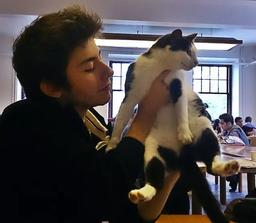In the verbs gitmek, etmek, tatmak and gütmek, the t at the end of the stem changes into a d when it is followed by a vowel.
| I am going home. | (Ben) eve gidiyorum. |
| Please taste the orange. | Lütfen portakalı tadın. |
| He is herding the sheep. | (O) koyunları güdüyor. |
| She is dancing. | (O) dans ediyor. |
The verb etmek sometimes sneaks up as part of a verb, such as in seyretmek and hissetmek. Seyretmek is a combination of seyir, which means observation, and etmek which means to do or to make. Hissetmek is a combination of his, which means feeling, and the verb etmek.
When the verb etmek appears in a verb like this, the t at the end of the stem also changes into a d when it is followed by a vowel.
| I feel good. | (Ben) iyi hissediyorum. |
| We are watching television. | (Biz) televizyon seyrediyoruz. |
Your questions are stored by us to improve Elon.io

